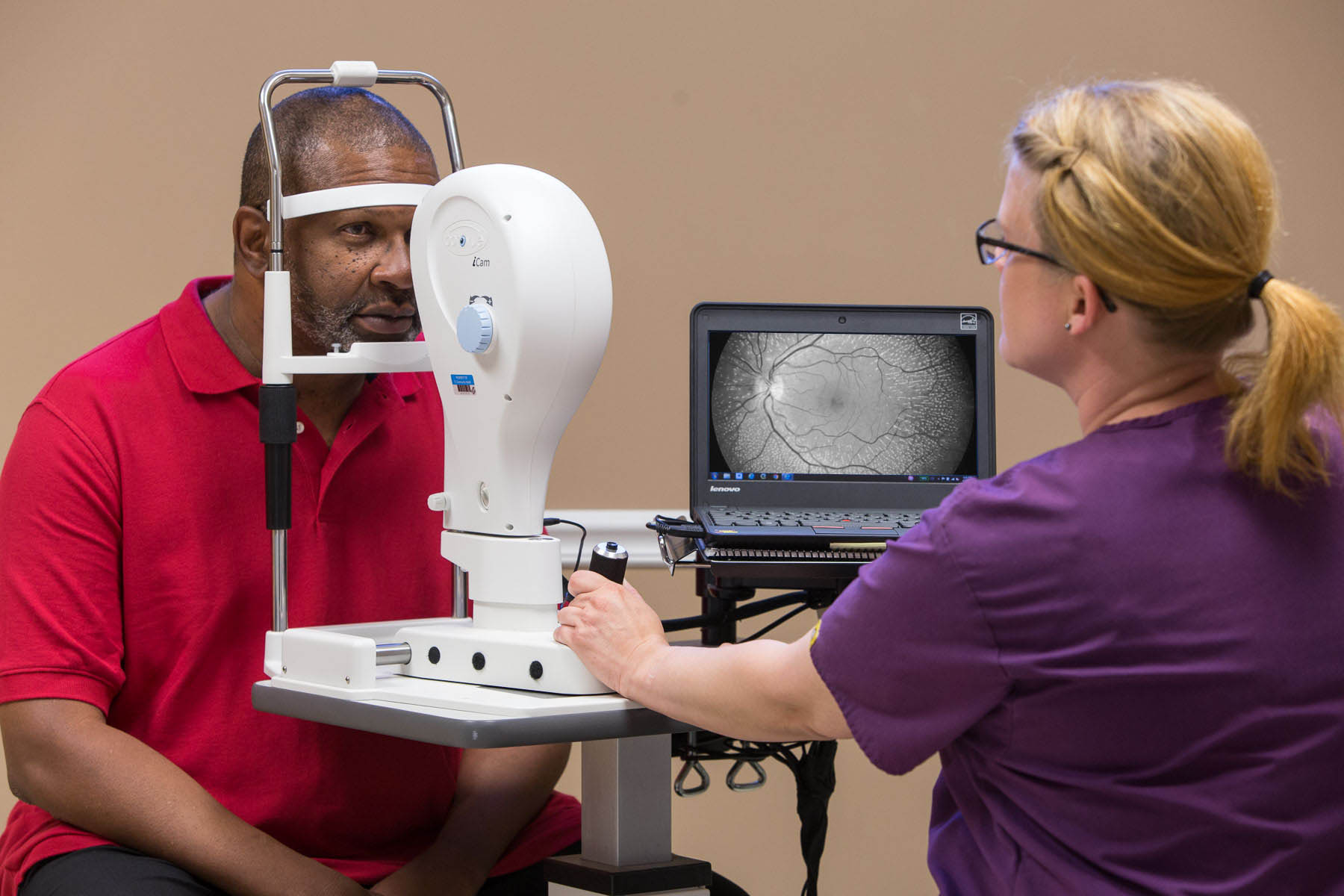How to prevent this sight-threatening disease—and how it’s treated if you’re diagnosed.
 By Carissa Jensen RN, MSN CDCES, Finger Lakes Community Health, an independent non-profit healthcare organization with nine health centers in the region.
By Carissa Jensen RN, MSN CDCES, Finger Lakes Community Health, an independent non-profit healthcare organization with nine health centers in the region.
There’s a serious condition of the eye that is a leading cause of blindness in people who have Diabetes. It’s called Diabetic Retinopathy, and anyone who has Diabetes is at risk. Elevated blood sugars damage the small blood vessels of the eyes’ retinas—light-sensitive layers of your eye leading to diabetic retinopathy and other eye diseases. In fact the longer you have diabetes, the greater your risk. More than half of people with diabetes will develop diabetic retinopathy, according to the National Eye Institute (NEI).
Symptoms to watch for
People with Diabetic Retinopathy often have no symptoms initially but can experience changes in their vision over time, such as difficulty reading or seeing things at a distance. As the condition progresses, the retina’s blood vessels bleed, causing dark spots or streaks in vision. Those symptoms may come and go for a while. Eventually, if left undetected and untreated, Diabetic Retinopathy can lead to blindness.
Why this happens to diabetic people
In Diabetes, our body is either not producing insulin at all or our body has become insulin resistant. In Type 1 Diabetes, the pancreas stops functioning and stops producing insulin altogether, whereas Type 2 Diabetes occurs when the body becomes resistant to insulin. Both conditions cause blood sugar levels to rise to unhealthy levels. Diabetic Retinopathy is often caused by prolonged high blood sugar—too much sugar in the blood. This prolonged sugar can damage the eye’s retina, as well as other organs, because it causes damage to both the small and large blood vessels all over the body. Elevated blood sugars can also lead to other eye diseases like glaucoma and cataracts, neuropathy, and kidney disease and can lead to an increased risk of stroke and heart attack.
Screening for Diabetic Retinopathy
All Diabetic patients need to get an annual Diabetic Retinopathy screening. This simple exam looks at the back of the eye as well as the outside of your eye. Your eye specialist can do this, or in some cases, such as Finger Lakes Community Health, we have special equipment in our office that takes pictures of the retina and the external part of the eye for review by an Ophthalmologist. To complete this screening, you must make an appointment at the nearest health center. If Diabetic Retinopathy or other eye diseases are detected, we can refer you to an eye specialist for further evaluation and treatment.
looks at the back of the eye as well as the outside of your eye. Your eye specialist can do this, or in some cases, such as Finger Lakes Community Health, we have special equipment in our office that takes pictures of the retina and the external part of the eye for review by an Ophthalmologist. To complete this screening, you must make an appointment at the nearest health center. If Diabetic Retinopathy or other eye diseases are detected, we can refer you to an eye specialist for further evaluation and treatment.
Typically, if you’ve been recently diagnosed with Type 2 Diabetes, you will be screened for Diabetic Retinopathy right away and then checked annually to monitor your eye health. If you are a Type 1 Diabetic, you should expect to be screened within five years of diagnosis and annually after that.
Preventing Diabetic Retinopathy
The best way to prevent Diabetic Retinopathy is to work with your medical provider and health care team. This means managing your condition, including keeping your blood sugar levels in a healthy range through lifestyle modifications, such as adequate nutrition, exercise, reduction of stress, getting adequate sleep , and medication if needed.
Healthy eating means eating well-balanced and nutritious meals throughout the day to help balance blood sugars. In other words, balancing meals with appropriate portions of food groups and limiting foods and beverages that are highly processed. Focusing on a balance of foods like bread, potatoes, and rice, high-fiber fruits and vegetables, and high protein. Eating protein and high-fiber foods such as vegetables, fruit, and nuts first allows us to make sure that carbohydrates don’t make up as large a portion of our diet. For great tips on healthy eating, visit the Cornell Cooperative Extension website.
If you’re diagnosed with Diabetic Retinopathy
The earlier you catch it, the easier it is to treat. If you receive a diagnosis of Diabetic Retinopathy at Finger Lakes Community Health, we’ll refer you to an appropriate provider for treatment and further evaluation. If you’re in the early stages of the condition, your medical provider will continue to monitor your eyes over time. Some patients may need an exam every few months. If the condition is more advanced, treatment must start quickly to keep your vision from getting worse.
We’re here for you
At Finger Lakes Community Health, our Diabetic Care Team understands what to look for and can help protect your vision. We will screen you right in our office for Type 2 Diabetes, evaluate any barriers you may be facing and help you find options that work for you and your lifestyle, including affordable medication to manage it, if necessary. We also have interpreters on staff and support with transportation if you need a lift here.
Find out more at www.LocalCommunityHealth.com.
Final thoughts
Talk to your Primary Care Provider next time you have an appointment. Ask them for details about when to go where—and who to call first. If you have a unique situation that makes it hard to decide, they can guide you in what to do before you have to make the call.


